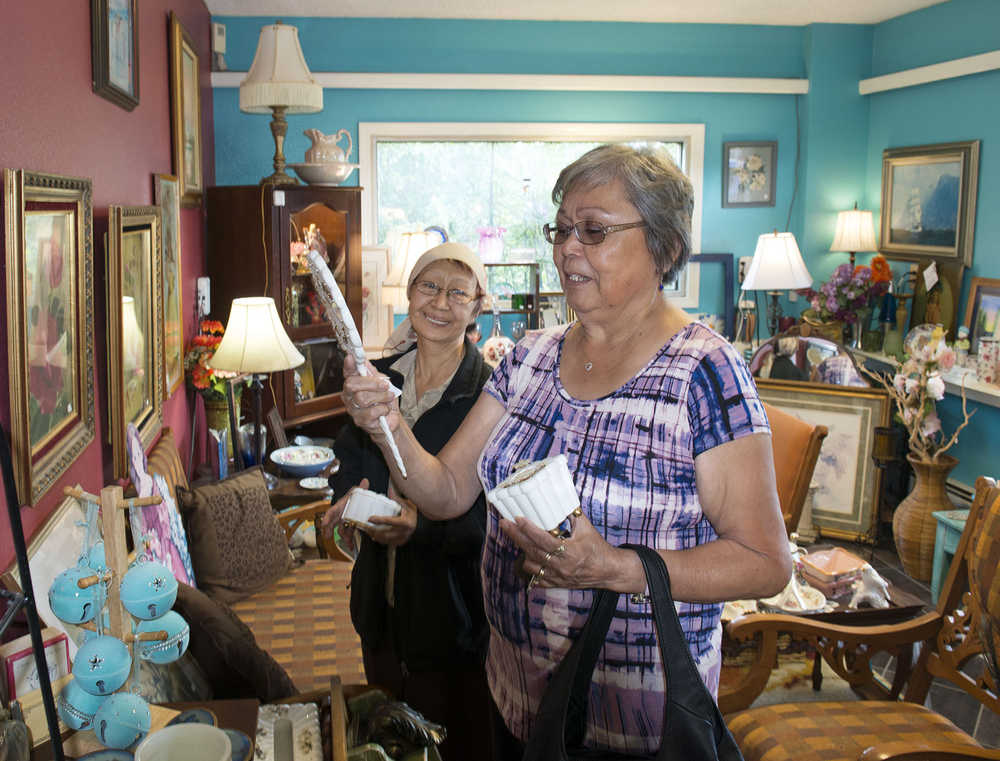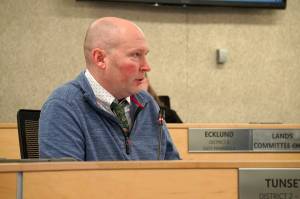Kenaitze program connects seniors for companionship, help
Published 5:53 am Tuesday, November 1, 2016
Soldotna was lonely when Laura Hobson and her husband moved there from Anchorage two years ago to retire.
These days, she keeps busy visiting other senior citizens on the central Kenai Peninsula, helping out with everything from making grocery store runs to simply providing company.
“I have one lady out in Nikiski, and I play cribbage,” she said. “I’ve never played it since I was in my teens, but I’m learning, catching on. … I have another lady, she’s in a wheelchair, and we sit and watch TV together. I just keep her company for an hour.”
Hobson is a volunteer with the Kenaitze Indian Tribe’s Senior Companions Program, which the tribe launched about a year ago. The federally funded program connects volunteers who are at least 55 years old with seniors who have physical, emotional or learning disabilities and meet an income requirement to help them stay independent.
When Hobson visits Rose Guilbeau, another of her clients through the Senior Companions program, they make runs to the Kenai Peninsula Food Bank on Kalifornsky Beach Road or to Walmart. Hobson drives Guilbeau around town for her errands and for outings, like one they recently made to the Nikiski Senior Center, she said.
Guilbeau, who said she is originally from Tanana and Anchorage, said she doesn’t have any family on the peninsula. Hobson helps her keep to her budget at the store and to accomplish the tasks she needs to do to stay independent, she said.
“(I signed up) for the companionship,” she said.
The program is still small with just a few volunteers, but the tribe has recently begun advertising it on the door of its new Tyotkas Elder Center and reaching out to tribal members who may be interested. The tribe received a three-year grant from the Corporation for National and Community Service — a federal agency tasked with coordinating volunteer program grants — to get the program going. They are currently in the second year of the grant, having received $585,644 so far.
Home health care can be hard to find on the central Kenai Peninsula.
Organizations like Frontier Community Services, the Independent Living Center or Hope Community Resources can provide services, though some have qualifications or limitations to the services they can provide. For instance, Hope Community Resources only serves those with mental, developmental and intellectual disabilities and traumatic brain injuries and the Independent Living Center only offers support for those transitioning from institutional care into a more independent living situation.
But there is still a need, as identified by the borough’s Healthcare Task Force in its recommendations to the borough. In Central Peninsula Hospital’s Community Health Needs Assessment released in January 2013, approximately 46 percent of central Kenai Peninsula residents identified increased assisted living resources as a need in the community. As the borough’s population ages, as demographers have projected it will, there will likely be a greater need for home health services as well.
Getting help to stay independent can be expensive. The average pay for a home health aide in 2010 was about $21 per hour, and a one-bedroom apartment in an assisted living facility cost about $3,293 per month, according to the U.S. Department of Health and Human Services. The cost varies by state as well, and Alaska’s health care services tend to be more expensive than the rest of the nation. Providing home health services to Alaskans on Medicaid also costs the state — in fiscal year 2015, the Alaska Department of Health and Social Services spent about $168 million on the waiver program that provides in-home personal care assistants to seniors and those with disabilities.
The program isn’t just for Kenaitze Tribe members, either — any senior in the community can be either a volunteer or a client as long as he or she meets the income eligibility requirements, said Heather Daniels, the Senior Companions Program coordinator for the tribe.
“It’s gaining some positivity and some awareness,” Daniels said. “I’m happy about that.”
Volunteers have to pass a background check and go through 40 hours of training before working with clients. Half of those hours are spent with Daniels, and the other 20 are looser, she said — volunteers can attend a class at Kenai Peninsula College or other types of training to round out their training. Although it’s a volunteer position, companions do receive a stipend through the grant funds.
She said she works with the volunteers on their training to get them comfortable before meeting with clients and acquainting them with ideas for activities. For example, she recently took a training group to meet with Kenaitze Indian Tribe managers to learn about the services the tribe provides in case an elder needs help with social services or housing. There are other resources in the community that can help volunteers be prepared too, like the Independent Living Center on Kalifornsky Beach Road, she said.
“I try to get them out of from having to sit all day,” she said. “Sometimes it’s helpful to have more hands-on training than sitting behind a computer or paper, pencil kind of thing.”
Multiple studies have linked isolation to worsening health and increased chance of death in seniors. While senior centers like those in most of the communities on the peninsula provide group activities, some cannot always make it if they cannot drive or have physical or emotional limitations.
The companions are able to help the clients stay independent for longer than they might otherwise as well as supplement the work the Kenaitze Indian Tribe staff does, Daniels said. The activities the clients and their companions do are up to them, which is part of the beauty of it, she said.
“Oftentimes … a lot of our staff are doing what needs to be done,” she said. “Volunteers get the benefit of getting to know another elder who in turn wants that companionship.”
When she visits Nancy Nelson of Soldotna, the two frequently go shopping in town. While they only knew each other in passing before getting involved in the program, the two are now friends. They meet once a week and make outings, sometimes something as simple as visiting a local antique shop and “reminiscing,” Nelson said.
But for Nelson, Hobson’s companionship provides more than just a chance to go window-shopping, she said. Nelson, who said she suffers from post-traumatic stress disorder, said she draws encouragement from being able to talk to Hobson about her difficulties.
“It has been very beneficial to me,” Nelson said. “I can talk with her. Most of my PTSD is from the loss of the people I’m able to talk to, and with Laura, I’m able to talk to her.”
The two have had their ups and downs in their relationship since Hobson joined the program in July — Nelson was her first client — but they’ve always been able to work it out, they said.
Hobson said she appreciated the Kenaitze Tribe’s screening efforts when she joined the program. She had to pass a set of tests and training before joining, and the two have to follow guidelines during their visits.
“I thought that was really something for the Kenaitze that they had really good training,” she said. “I like to learn things, so I sign up for anything that’s out there.”
The program can teach people how to be more independent, bridging the gap so they don’t necessarily have to go into an assisted-living home, she said.
“There’s someone there to come by once in awhile,” she said. “If they’re unable to walk or something like that, it’s really good for them.”
Anyone interested in signing up for the program as a volunteer or client can contact the Tyotkas Elder Center in person or by phone at 335-7280.
Reach Elizabeth Earl at elizabeth.earl@cmg-northwest2.go-vip.net/peninsulaclarion.





